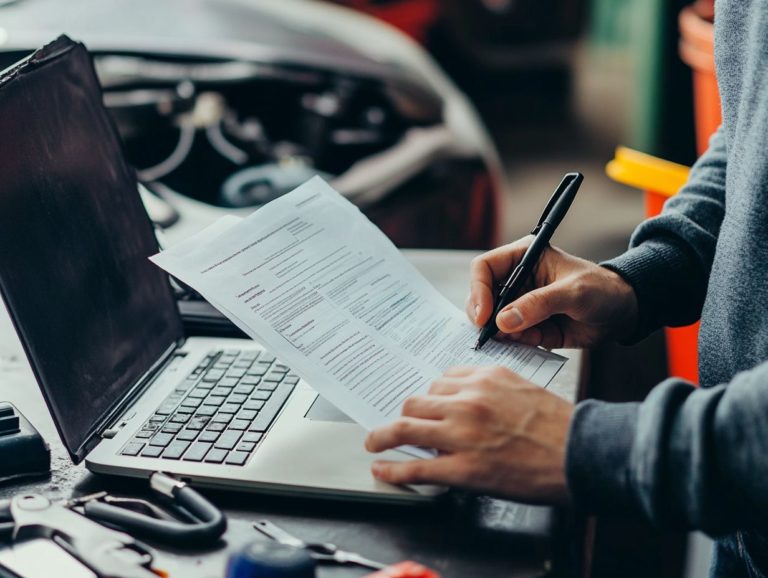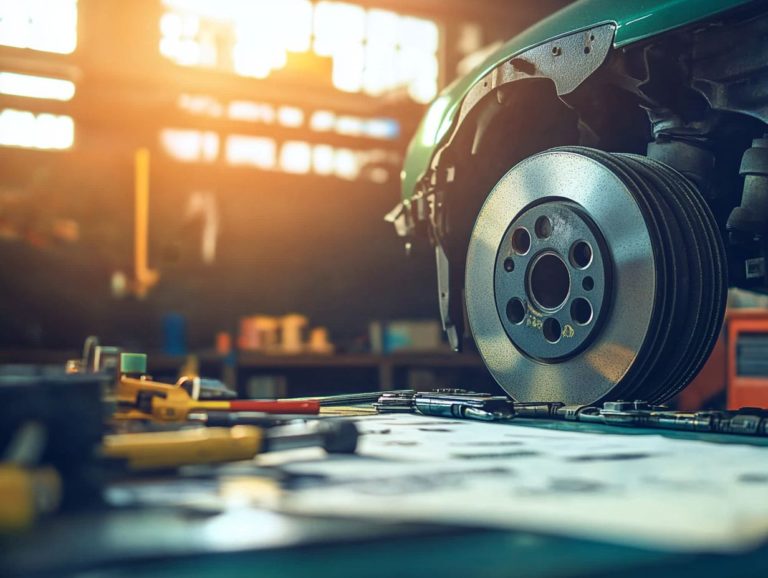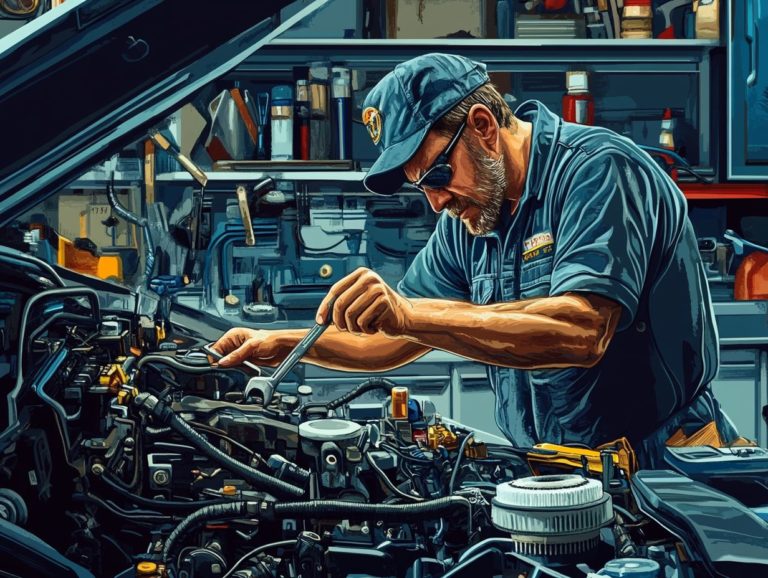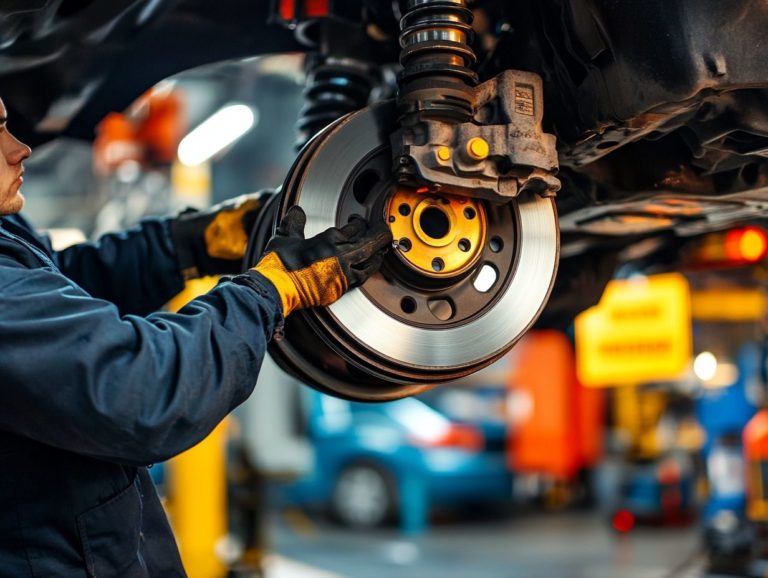Common Fuel System Problems and Solutions
Understanding your vehicle’s fuel system is essential for maintaining optimal performance and steering clear of expensive repairs.
This article delves into common fuel system issues, beginning with how to spot the symptoms that indicate trouble is brewing. You ll explore the potential causes behind these malfunctions, discover essential maintenance tips to ensure your system operates smoothly, and find practical solutions for specific problems. You ll also learn when to get professional help. Keep reading to empower yourself with knowledge and keep your vehicle in peak condition!
Contents
Key Takeaways:
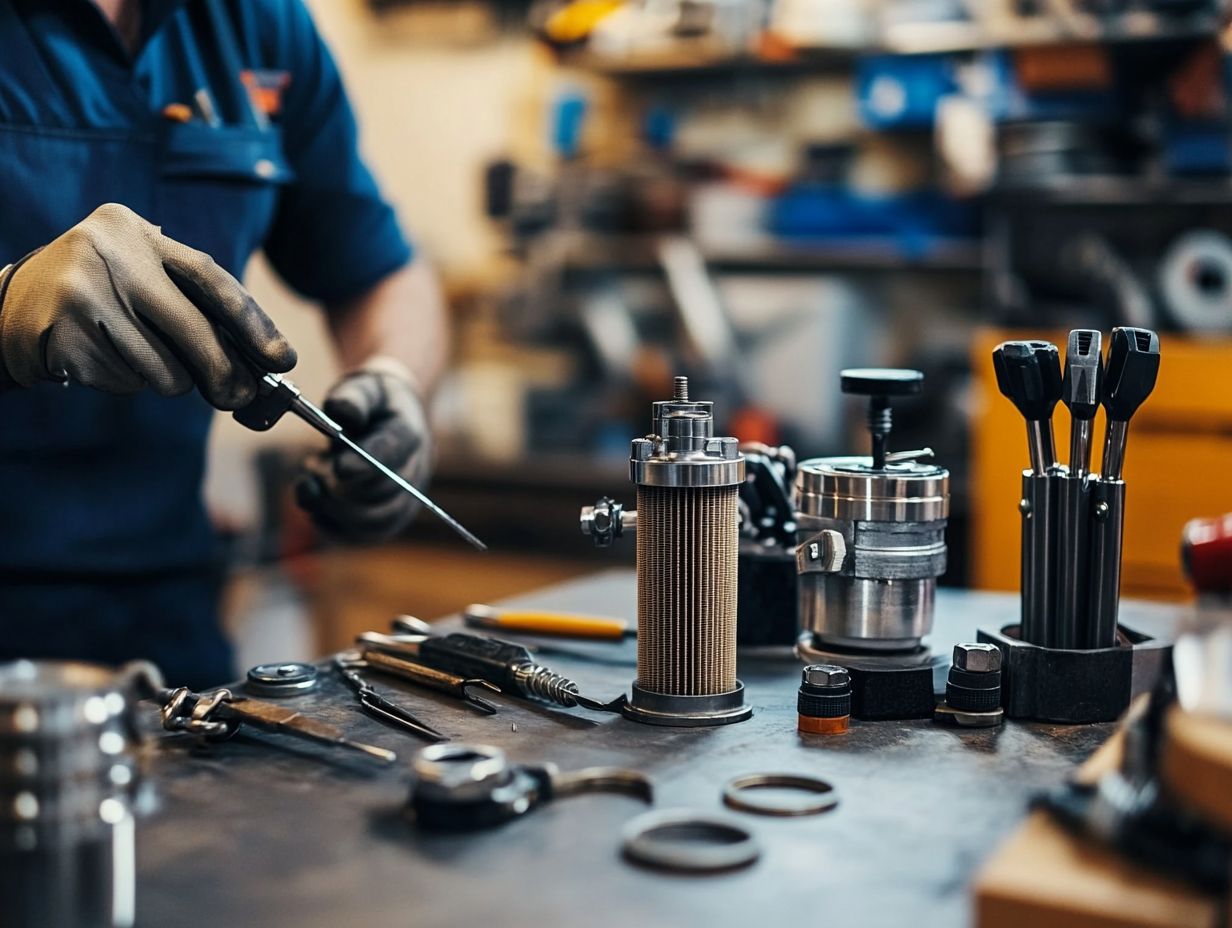
- Regular maintenance is key to avoiding fuel system problems.
- Identifying symptoms early on can prevent costly repairs in the future.
- Seeking professional help when needed can prevent further damage and ensure proper diagnosis and solution.
Overview of Common Issues
In terms of vehicle maintenance, grasping the common issues related to the fuel system is crucial for ensuring optimal engine performance and longevity.
Neglecting fuel system problems can greatly compromise your vehicle’s performance. Consider a clogged fuel filter it can really slow you down! It restricts fuel flow and makes it challenging for your engine to receive the necessary amount of fuel. This can manifest in symptoms like stalling, sluggish acceleration, or even engine misfires.
A malfunctioning fuel pump might not maintain adequate pressure, leading to struggles during high-demand situations such as merging onto highways or driving uphill. Contaminants in gasoline, like dirt or water, can introduce a host of issues, including reduced combustion efficiency and increased emissions.
By conducting timely inspections and maintenance of your fuel system, you not only enhance your driving experience but also avoid the costly repairs that can arise from neglecting these vital components.
Signs of a Fuel System Problem
Recognizing the signs of a fuel system problem is vital for preserving your vehicle’s engine performance. Symptoms often present themselves through engine stalling or a rough idle.
These warning signals may suggest that your fuel injectors the parts that spray fuel into the engine are clogged or that contaminants in the gasoline are compromising fuel quality, hindering the engine’s ability to achieve optimal combustion conditions. Stay attuned to these indicators to keep your vehicle running smoothly!
Identifying Symptoms
Identifying symptoms of fuel system problems often requires a detailed series of engine diagnostics to uncover issues like fuel injector malfunctions or a clogged fuel filter that could be impacting engine performance. By paying attention to changes in your vehicle’s behavior like a dip in fuel economy or odd noises when revving the engine you can gain valuable insights into the health of your fuel system.
Utilizing diagnostic tools, or devices that help check car issues, such as OBD-II scanners tools that help you find problems in your car can greatly assist you in pinpointing specific trouble codes related to the fuel system. These devices offer real-time data, enabling you to monitor critical parameters like fuel pressure and oxygen sensor output.
Employing techniques like visually checking for leaks or inspecting fuel lines can also provide significant insights. A thorough fuel system cleaning might just alleviate some symptoms, helping ensure your vehicle runs optimally.
Being vigilant about signs such as stalling or rough idling gives you the power to tackle potential issues before they snowball into costly repairs.
Causes of Fuel System Problems

Grasping the root causes of fuel system problems is essential for maintaining your vehicle s performance. These issues frequently arise from fuel contamination or malfunctioning components, such as the fuel pump or a clogged fuel filter.
Elements like poor fuel quality, high-pressure fuel pumps, and problems within the fuel lines can hinder performance, often necessitating extensive engine diagnostics to pinpoint the underlying issue.
Understanding these factors gives you the power to take proactive steps in vehicle maintenance, ensuring a smoother and more efficient ride!
Summary: Regular maintenance and early detection of symptoms are vital in keeping your fuel system functioning well. Don t hesitate to seek professional help if needed!
Potential Reasons for Malfunctions
Potential reasons for fuel system malfunctions can range from issues with the fuel pump to problems with fuel quality, such as contaminants and clogged filters. A faulty fuel pressure regulator can disrupt optimal fuel delivery, leading to performance issues that need immediate attention.
Critical components like fuel injectors also play a significant role. When these become dirty or malfunction, your vehicle’s engine might experience misfires or reduced efficiency. The quality of fuel you use is essential; low-grade or contaminated fuel can diminish engine performance and lead to long-term damage.
Irregular maintenance practices can worsen these problems. Routine inspections are crucial to ensure every element of your fuel system functions properly. By addressing these factors diligently, you can promote a smoother and more reliable riding experience.
Preventive Measures for a Healthy Fuel System
Implementing preventive measures for a healthy fuel system is paramount for long-term vehicle maintenance and optimal engine performance.
Don’t wait start using these maintenance tips today:
- Use fuel treatments to keep your system clean.
- Perform timely oil changes.
- Adhere to best practices for fuel tank upkeep.
These steps can significantly enhance your fuel efficiency and reduce the chances of encountering fuel system issues down the road.
Maintenance Tips to Avoid Problems
To prevent fuel system issues, regular vehicle maintenance is essential. This includes timely oil changes and cleaning fuel injectors. Visit a trusted tire dealer or auto repair shop for expert service to keep your fuel system running smoothly.
Keep an eye on your fuel filters; clogged filters can seriously impede your vehicle s performance. Checking for leaks and monitoring fuel pressure will help catch potential problems early. Scheduling periodic inspections aids in the early detection of issues and extends your vehicle’s lifespan.
By prioritizing these straightforward maintenance practices and working with qualified technicians, you can significantly reduce the chances of facing unexpected, costly repairs in the future.
Solutions for Common Fuel System Problems
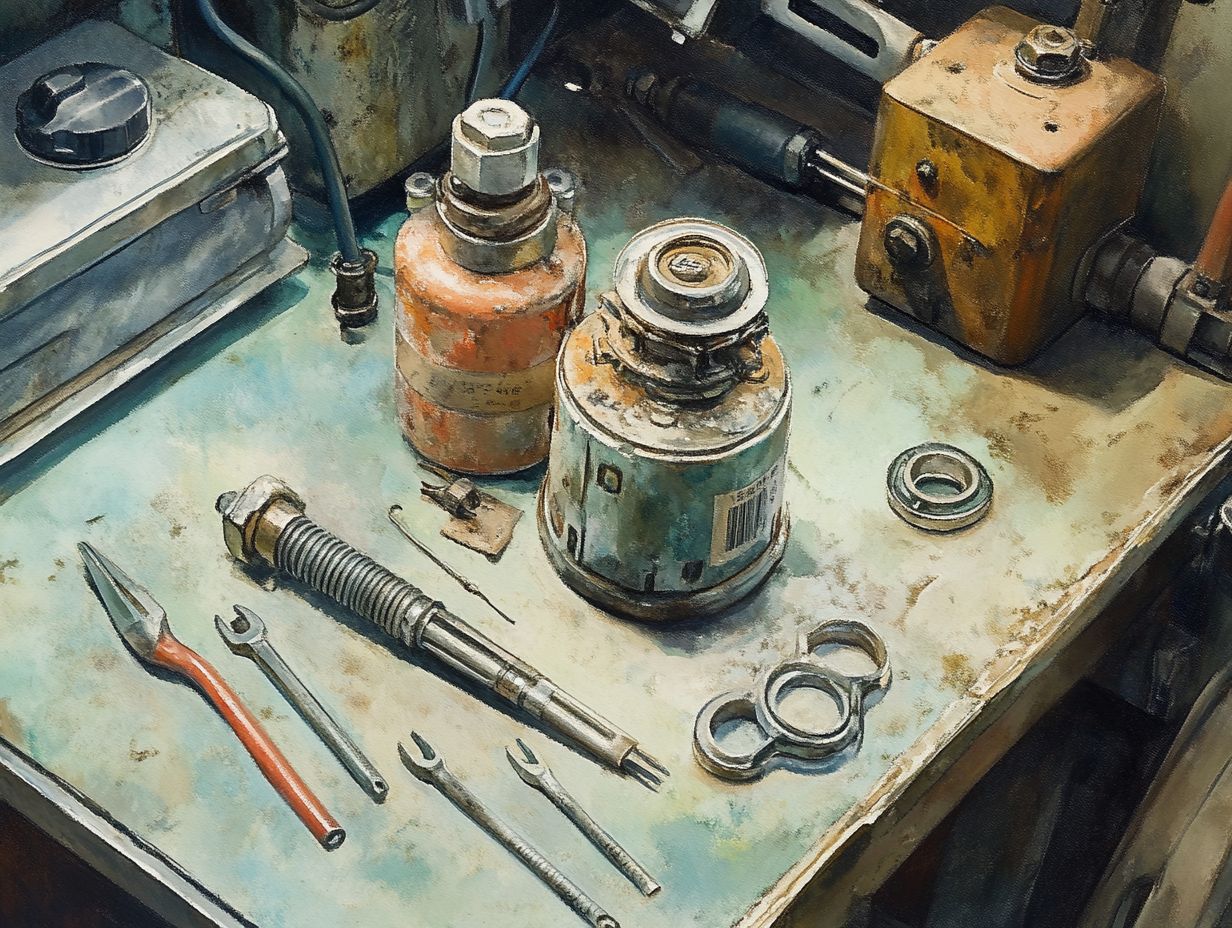
When you encounter common fuel system issues, effective solutions often combine elements of engine troubleshooting techniques and specialized services like cleaning the fuel system and injector cleaning.
By addressing fuel delivery problems, you can restore your engine’s optimal performance and prevent complications down the line.
Fixes for Specific Issues
Addressing specific fuel system issues, like a malfunctioning fuel pump or clogged filters, requires a targeted approach to restore your engine’s performance and ensure fuel quality. Tackling these problems promptly can prevent further complications and boost your vehicle’s overall reliability.
If you suspect your fuel pump is failing, consider conducting a DIY diagnostic with a fuel pressure gauge to evaluate its functionality. Regularly cleaning filters is essential to avoid clogs that could lead to engine stalling or subpar performance.
For more serious issues, such as a leaking fuel injector, seeking professional assistance is crucial. Experienced mechanics can perform thorough inspections and recommend the best course of action, whether that involves repairing or replacing components.
By balancing DIY solutions with expert advice, you can effectively address fuel system challenges and maintain your vehicle’s optimal performance.
When to Seek Professional Help
Understanding when to enlist professional assistance for fuel system issues can save you time and money, especially when faced with ongoing engine performance problems that require advanced diagnostics.
Turning to experts is often crucial for precise problem identification and effective resolution, ensuring your vehicle operates at its best.
Indicators for Professional Assistance
Pay attention to your vehicle! Do you suspect you need professional help for fuel system issues? Watch for signs like frequent engine stalling or a rough idle. These symptoms can indicate deeper problems within the fuel system that need expert attention. If you ignore these signs, it could lead to a significant decline in engine performance.
Other signs to watch for include decreased fuel efficiency, unexplained engine misfires, or persistent warning lights on your dashboard. These issues are not just minor inconveniences; they are critical clues suggesting potential malfunctions in components like the fuel injectors, fuel pump, or fuel filters.
Getting help quickly not only helps pinpoint the exact problem but also helps with timely repairs. If you delay getting help, it could lead to more extensive damage, skyrocketing repair costs, and a longer time for your vehicle to be off the road.
Recognizing these indicators and taking prompt action can save you significant time and money in the long run.
Frequently Asked Questions

What problems might my fuel system face?
Some common fuel system problems include clogged fuel filters, failing fuel pumps, and damaged fuel injectors.
How do I know if my fuel system is experiencing issues?
You may notice signs such as difficulty starting your car, decreased fuel efficiency, and engine misfires.
What can cause fuel system problems?
Fuel system issues can arise from various factors, including low-quality or contaminated fuel, old or worn-out components, and improper maintenance.
How can I prevent fuel system problems?
To avoid these issues, it s important to regularly maintain your vehicle and use high-quality fuel. You should also replace your fuel filter according to your car’s recommended schedule.
What are some common solutions for fuel system problems?
Typical solutions include replacing clogged fuel filters, repairing or replacing failing fuel pumps, and cleaning or replacing damaged fuel injectors.
Can I fix fuel system problems on my own?
Some issues, like replacing a fuel filter, can be done on your own. However, more complex problems may require professional help and should not be attempted without proper knowledge and equipment.
Stay proactive about your vehicle’s health, and don t hesitate to seek help if you notice these symptoms!

